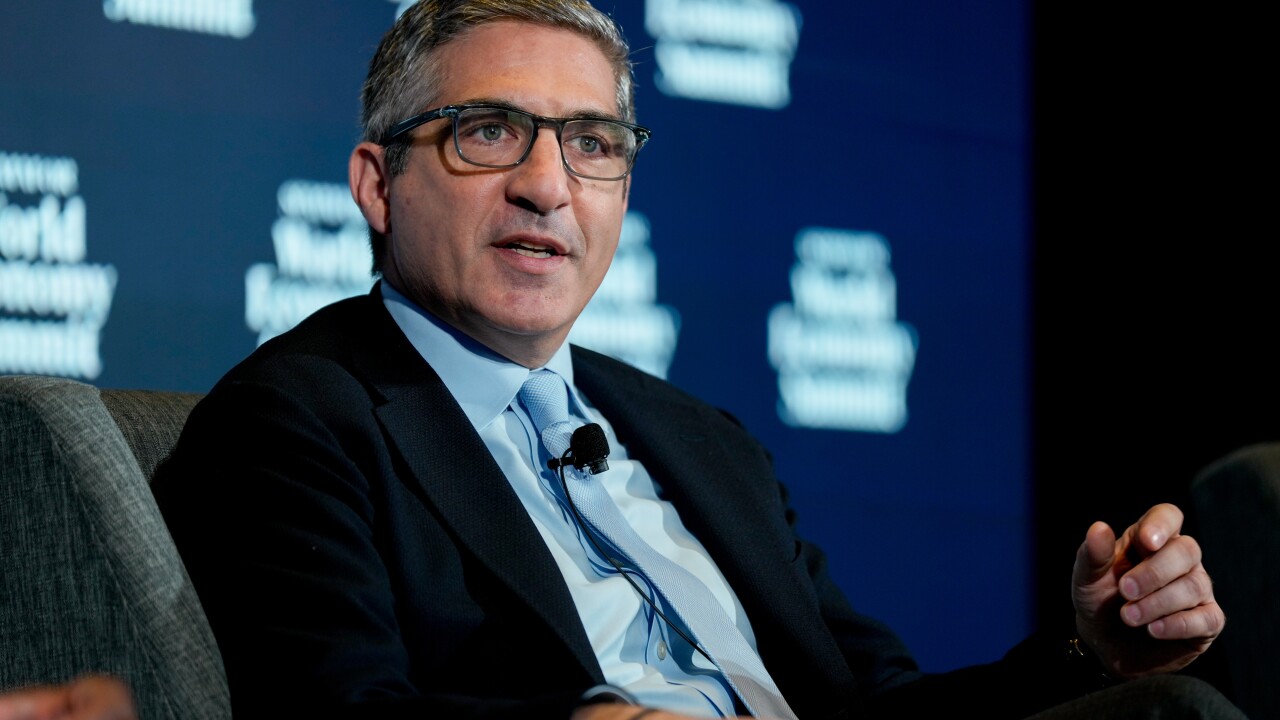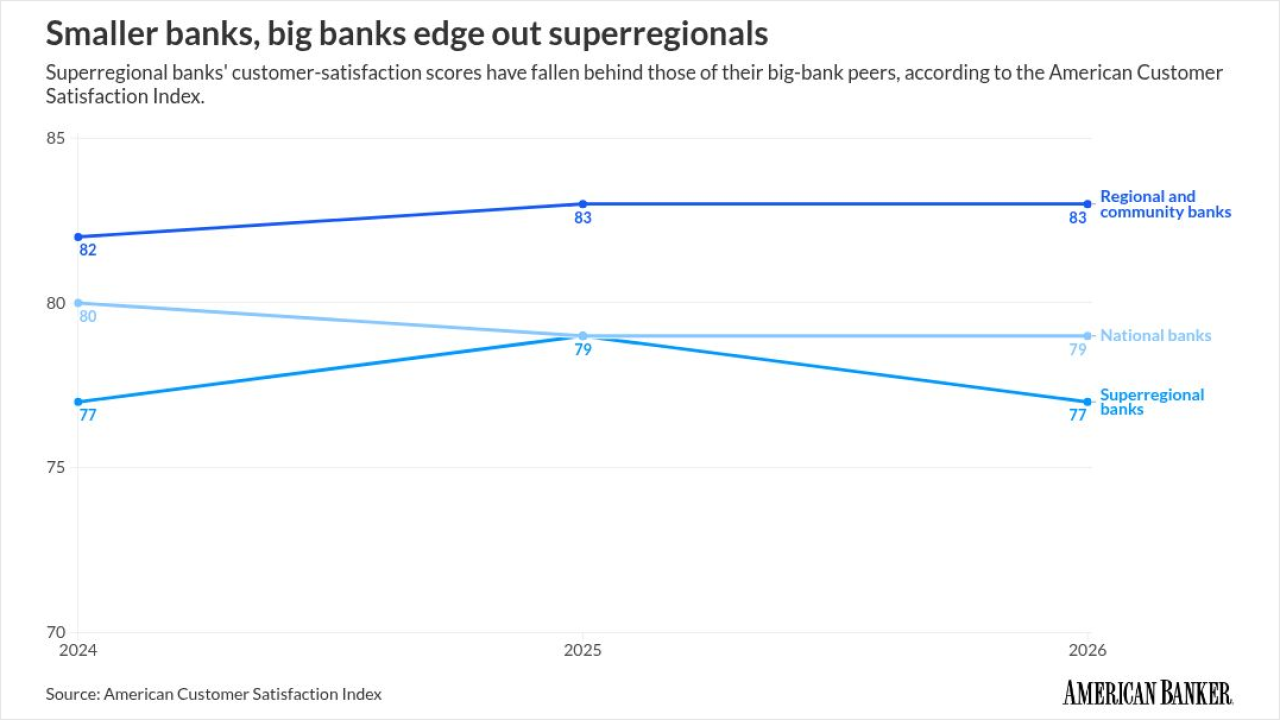The National Automated Clearing House Association has changed its once narrow agenda to reflect the anticipated influence of the Internet.
Processing Content
It gave its annual conference - held this month in San Francisco - a new name, Payments '96. And it invited Intuit Inc. chairman Scott D. Cook to give the keynote speech.
Mr. Cook, after a few general comments about the Internet's effect on banking, unveiled a prototype wholesale bill payment service that Intuit is developing with BankAmerica Corp., Chase Manhattan Corp., and Mellon Bank Corp.
The service would let banks handle both payment and remittance functions for their corporate customers. The idea is to "turn the lockbox into a bigger solution that manages the entire receivables area, both paper and electronics, on behalf of the biller," Mr. Cook said.
Though some were excited by the concept - Mr. Cook called it "receivables management" - the conference chairman, Thomas A. Gregory, termed it "ho-hum."
Mr. Cook knows "a whole lot about what banks are doing, but he knows more about retail and small business, I think, than he does on the big biller side," said Mr. Gregory, a vice president at CoreStates Financial Corp., Philadelphia.
Mr. Cook is correct in seeing a desire for a "complete solution," Mr. Gregory said. But if he is talking about what many cash managers call "receivables outsourcing," the CoreStates banker said, it is a service that many banks, CoreStates included, have been selling to corporations for years.
*
Mr. Gregory's reaction may have indicated that bankers active in payment systems and strategies may not find the answers they want from computer-age celebrities like Mr. Cook.
But the broader Nacha conference agenda did not hurt attendance. Payments '96 attracted 200 more people than last year's 1,300.
Elliott McEntee, the association's president and chief executive officer, said the San Francisco event was the "most important conference in the 23-year history of Nacha. This is not just an ACH conference anymore."
*
To underline its Internet concern, the clearing house group added an Internet Task Force to its list of committees and working groups.
"The goal is to provide a structured arena to influence development of the payment system," said Andrew Higgins, chairman of Nacha and senior vice president at Barnett Banks Inc.
"Technology is leading the market," Mr. McEntee added. "In order for commerce on the Internet to receive widespread acceptance, the payment system and the Internet must have a strong unifying foundation."
Meanwhile, Nacha is organizing another conference, Cyberpayments '96, scheduled June 18-19 in Dallas. Microsoft Corp. and Cybercash Inc. are co- sponsors.
"The Internet will be ... a new marketplace that will create billions and billions of new electronic payments," Mr. McEntee said.
*
The Internet may have grabbed the Payments '96 spotlight, but there were plenty of garden-variety product announcements.
Empire Corporate Federal Credit Union, an Albany, N.Y., institution that processes automated clearing house transactions for 320 credit unions in New York and Rhode Island, said it had joined Pax, a private-sector alternative to the Federal Reserve's ACH system.
Pax is run by the New York Clearing House Association, Visa U.S.A., and the Arizona Clearing House Association, which operate their own ACHs.
Scott Brannon, assistant vice president at Empire, said the credit union would transmit 100,000 ACH transactions a month through Pax starting in July. Pax's current total is about 600,000 a month, and it has been struggling to build volume since its inception in 1994.
"Empire's membership should dispel the myth that the private-sector operators are only interested in large financial institutions," said George Thomas, senior vice president at the New York Clearing House.
*
The New York Automated Clearing House Association announced the formation of an electronic payments marketing task force.
Comprised of officials from Chase Manhattan Corp., Citicorp, Fleet Financial Group, Manufacturers & Traders Trust Co., Midlantic Corp., National Westminster Bancorp, and PNC Bank Corp., the alliance aims to promote direct deposit services in New York, New Jersey, Puerto Rico, and the U.S. Virgin Islands.
Although some dispute the contention that 45% of paychecks in the United States are deposited automatically in bank accounts, most in the New York Federal Reserve District agree that their region's 30% penetration is well below the national average.
Frank Sardina, executive director of the New York Automated Clearing House, said member banks have been so concerned about controlling the marketing material sent to their customers that they have not taken advantage of national ACH promotional efforts.
"This strategic alliance is symbolic because it is organizing financial institutions of all sizes to work together to increase the use of direct deposit," said Alan Slater, chairman of the task force and a vice president at Citicorp.
*
MCI Telecommunications Corp. and the National Automated Clearing House Association announced the availability of a long-awaited electronic data interchange software package.
The system, Rapid EDI, was two years in the making; it is designed to ease the way for community banks into electronic data interchange. EDI is the electronic exchange of business documents and payment information.
About 100,000 companies use this interchange, typically for purchase orders and invoices, according to the Gartner Group, a Stamford, Conn., research and consulting firm.
With many large corporations forcing their banks and trading partners to become EDI-capable, use of the technology is growing at a compound annual rate of up to 28%.
Citizens Bancorp of Laurel, Md., and five other banks are testing Rapid EDI. Since piloting the software, Citizens has sold the service to 35 corporate customers.
MCI, which developed the software and networking options with Certisoft Solutions Inc. and the New York Clearing House, is preparing its 6,000- strong sales force for a full-scale marketing assault.
Nacha, in its rulemaking role for automated clearing houses, will monitor the banking industry's reception of Rapid EDI and other low-cost alternatives. If they succeed, Nacha may consider a rule mandating EDI capability.
*
Norwest Corp. of Minneapolis and Toronto Dominion Bank announced an agreement to be "gateway operators" for their respective countries' ACH systems.
Their reciprocity would let U.S. businesses, using their local banks, originate ACH payments to individuals or corporations in Canada.
Correspondent banks could agree to make Norwest their bridge to the Canadian automated clearing house. Norwest and Toronto Dominion would then do the format conversions, currency exchanges, and settlements.
Cross-border correspondent banking is not new, "but this is the next level up," said Kristy Duncan, product manager in cash management services at Toronto Dominion.
"It helps make it easier for U.S. companies wanting to make payments into Canada," she said.





